One soccer ball purchased in June 2013 has begun to change hundreds of lives in seven small villages in Kenya.
As the FIFA Women’s World Cup in Canada 2015 draws nearer, preparations are underway in Madison, Wisconsin, and in tiny villages around Lunga Lunga, Kenya, to create a round-robin women’s soccer tournament in Kenya. The Nikumbuke Women’s Soccer League may not yet register on a global scale, but the work started by University of Wisconsin women’s hockey player Brittany Ammerman may have far-reaching gender equality implications.
[youtube_sc url=https://www.youtube.com/watch?v=KwfvgFxAHjk width=500]
The Nikumbuke Women’s Soccer League is spearheaded by the fifth-year senior, who first traveled to Kenya in summer 2013 as part of the Nikumbuke Health by Motorbike program run by University of Wisconsin professor Dr. Araceli Alonso. A partnership with the UW School of Medicine and Public Health, the UW Morgridge Center for Public Service, and the UW Center for Gender and Women’s Studies, the program takes students to Kenya to teach the women in rural areas about women’s biology and health and help provide the means for women to continue to serve themselves and their communities. Nikumbuke means “Remember Me” in Swahili.
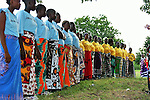
According to Dr. Alonso, via email, “Health by Motorbike (HbM) (has been) working with the women in this area for six years. We started with three villages, then five, and now seven. HbM uses a circular model that starts with the women: with their needs, their desires, their dreams … then we request the support of the local government and of the local Ministry of Health.”
While Ammerman was in Kenya, she purchased a soccer ball, intending it to be a way to interact in the villages she was staying in and help pass downtime. She expected it would be popular among the children, but to her surprise, it was the older women in the tribe who were most excited to play. While HbM was serving the very necessary physical health needs of the community, it turned out that soccer provided a much-needed mental health outlet for them as well.
“This sport and something as simple as a soccer league can make these women feel empowered and have a sense of agency,” said Ammerman. “These women are empowered by this, and then they can step up and be leaders of their villages and then they can go into government or somehow get primary schooling or come to the U.S. and play a sport. There are so many unlimited possibilities out of something so small.”
After Ammerman’s student group departed Kenya in summer 2013, Dr. Alonso remained, living with many of the women the program had served. One of the things she hoped to learn from the various villages was what other services HbM could provide for them on the next trip.
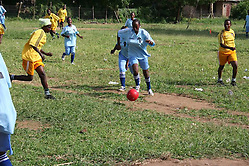
Explained Alonso, “Before I left, I asked the women in a meeting ‘What is next for your village? What do you want to achieve for next year?’ The women did not speak; they were looking at each other like they had something to say. Suddenly, one of them raised her hand and shouted ‘We want a soccer team!’ I thought ‘With so many needs that women have in the village, and they are thinking about a soccer team!’
“Britt was fantastic in all senses: serious, but fun, approachable, enthusiastic, responsible, always helping others, the bestest of the bestest.”
Ammerman first created a small online T-shirt fundraiser and began gathering money to purchase uniforms for the two villages, Jirani and Mpakani. She had plans to return to Kenya with her mother to be able to see the first-ever game between the two villages in person. Unfortunately, terrorist activity in two of the three cities she was meant to be traveling through three days before her trip meant Ammerman stayed home.
The first game of the Nikumbuke Women’s Soccer League was played on June 14, 2014. Alonso was back in Kenya with another group of HbM students and described the game:
“The day of the first soccer game between Jirani and Mpakani women was one of the most magical moments I’ve witnessed in my life,” she said. “Hundreds and hundreds of spectators gathered to see this very unique event. My students and I cried. It was very emotional. For every single score, all the women from that village got to the field, dancing and shouting. During each break, some of the women players breastfed their babies, who were waiting with relatives.”
The impact of that single game was to energize not only the two teams that played, but the surrounding villages as well. Now four more villages, Lunga Lunga, Godo, Pirani, and Umoja, as well as the nomadic Maasai tribe, have all requested uniforms and help forming teams. For that, Ammerman knew she’d need help, and perhaps a corporate sponsor.
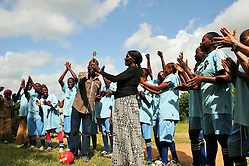
“I went on Google and tried to find women who used to play on the U.S. Women’s National Team – from the ’99 team that won the World Cup – because those girls were my idols,” said Ammerman. “I emailed a bunch of them through their foundations and agents. Julie Foudy, I sent her agent an email with the video (of the soccer game) and it was maybe two days later and Julie Foudy herself emailed me back ‘Holey moley Britt, this is the coolest thing I’ve ever seen; let’s set up a call. I’m going to help you in any way I can.’ Two weeks later I’m on the phone with her.”
Ammerman and Foudy have been in communication ever since, planning, working on securing sponsorship to cover the cost of uniforms, and hopefully sending Ammerman back to Africa over her spring break with a camera crew to capture the story. All of those plans are in the works, but are thus far unconfirmed, according to Foudy, via email.
“I am helping Brittany because I was impressed with what she started,” said Foudy. “I saw the video of the game and knew I had to help. I just love that Brittany is driven to want to help spread the gift of sports to other women and that she cares so deeply that she reached out for help. I just love what she is doing (and) hoping I can be of some help!”
For Ammerman, the formation of the league, the attention it’s garnered, and now the partnership with Foudy are all beyond anything she imagined. She’s both shocked by its growth and somewhat reluctant to be the face of the program, but she understands that being a national championship-winning NCAA athlete in a sport other than the one she’s helping to spread is part of what makes the Nikumbuke story interesting.
She went to Kenya because she’s a biology/pre-med and women’s studies major. The idea of working with and empowering women aligned with her life experiences as a female athlete who grew up playing a sport not widely thought to be a women’s sport.
Ammerman played soccer in her youth and was 10 years old when the 1999 World Cup happened. Like many female athletes of her generation, that summer was a seminal moment for her.
“That was really the first time that women’s athletics was on a greater stage than men’s was, and it was televised,” she explained. “I got to go to one of the games at Giants Stadium and I just vividly remember getting to see these women play sport and thinking ‘Oh, that could be me someday.'”
Working with one of the players from that team that she grew up idolizing to help spread the sport, and with it the feeling of empowerment, self-worth, and agency, is something that’s left Ammerman a little shocked, a lot disbelieving, and more than a little humbled.
“I’m excited about it, but I’m more excited about the opportunity that these women are getting,” Ammerman said. “I’m just itching for March to come around and for me to go down there and see these women in person playing this game that’s making all these villages cohesive and forgetting all the turmoil between them. I get emotional every time I watch the video. There were so many people at this one game, so how many people will be there when it’s their own village?”
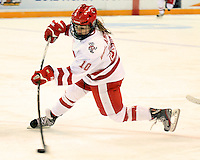
Perhaps the most impressive part of the story is that Ammerman is facilitating this while in the middle of her final year of school, where she’s taking her hardest pre-med classes, shadowing a surgeon, working in a research lab, and playing on the top line for the No. 3 women’s hockey team in the country. Halfway through the season, Ammerman leads the Badgers with 23 points on 10 goals and 13 assists.
While she’s focused on her season and finishing her career at Wisconsin on a high note, she’s always been aware that life as a female athlete means little in a post-collegiate world. Delaying that plan for a year before she enters medical school in order to make a difference in hundreds of lives is the kind of detour in her life plan she’s happy to make.
“We’re empowering them and through this soccer league, there’s almost no better way to do it,” said Ammerman. “They’re getting pride and they’re doing something that the men aren’t even doing. It’s one thing these women can grasp on to.
“I always promised I’d use (this) athletic platform to better the world and better women’s empowerment in general, because that’s what I’m passionate about. Yeah, we’ve put our hearts into playing on the ice every day and coming to school to play hockey, but at the end of the time at Wisconsin, it’s going to end and you need to have something else to look forward to and put your passion into.”
The individual villages are scheduled to play games once per month between now and next summer. Not only will the women be able to practice and improve, but it ensures they have at least one day a month for themselves.
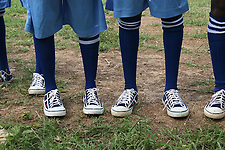
In the meantime, Ammerman will continue to spread the word about the league, garnering attention and support. Her aim is to not only provide each team with uniforms, but to look into providing equipment from balls on up to goals and nets. She’s running an IndieGoGo Campaign through mid-January to raise money and awareness.
“I’m just giving them the tools to be able to play a sport so that they can empower themselves,” she said.
Read more about Nikumbuke Health by Motorbike here.
Read more about Nikumbuke Women’s Soccer League here.
Donate to the IndieGoGo Campaign here.


